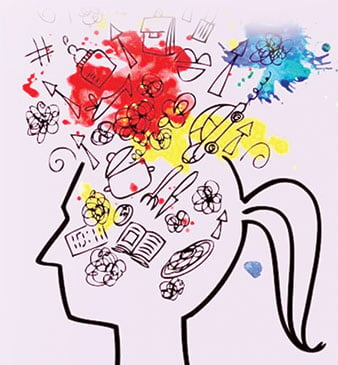Ask the right questions
COVER STORY
Is it just me or do people analyze their conversations after they’re done? You know, reliving it in your head, thinking of better words that could have expressed what they wanted in a better way? Once the person has moved on, I think too much about what I just told them, like pretty much everything else, editing, checking, until it becomes that perfect copy ready to go. be delivered. But, yeah, there’s a catch, real conversations don’t turn out like that, do they? They are spontaneous. Which is both exciting and, well, for those who are shy like me, intimidating. Imagine being intimidated by something as simple as starting a conversation. Fearing what comes so naturally to those around me (I’m guessing here). How to get a message across or, in the worst case, how to recognize how you feel because you are unable to communicate effectively with yourself!
The good thing here is that people are constantly changing. They are not meant to stagnate in one place or in one condition. They seek to improve themselves in order to lead the life they want and deserve! And that’s what I strive to do too. Everyday. I don’t mind asking those who are obviously good at what I “miss” for help, but a lot of times those “suggestions” and “motivational talks” got me nowhere.
I came across an accelerated learning strategy for the detection and use of models in the world: Neuro-Linguistic Programming (NLP) – neuro from neurology; linguistic (s) for language; and programming refers to how the neurology and language system works in our brains. It sounded good, almost like I was going to learn the language of my mind!
Like any new field, NLP training and coaching is still an emerging field in Pakistan, although it started in the 1980s in the West. It is only now that Pakistanis are inclined to learn / know the sciences of the mind, some maybe more interested in investing in themselves, their own mental and psychological development. As it is expensive, you don’t want to go wrong. Arslan Larik, American Board of Neuro-Linguistic Programming (NLP), Timeline Therapy, Hypnosis, and ICF Certified Master Coach & Trainer, and a passionate entrepreneur with a strong belief in the power of empathy, breaks it down for us .
Dispel misconceptions
Before we understand what NLP is, let’s take a look at what it is not.
Myth # 1: NLP is mind control and manipulation.
Do: I haven’t seen anyone controlling someone else using NLP even though you can use NLP to influence other people. Most of the time, people can’t even control themselves.
NLP can allow you to relate to other people and their subconscious, then you can increase your ability to influence and influence them. The more you can connect with someone subconsciously, the more you will be able to influence them. I was teaching an NLP course once and I had this realtor Y who was interested in making more sales. I asked Y to show me how he was showing open houses to potential buyers. I really had aha moments when I realized he wasn’t connected enough to the emotions of his prospects. By making some minor adjustments to his sales process using NLP techniques, the training was more fruitful. It is not mind control; NLP is all about connecting with people on an emotional or unconscious level, outside of their consciousness.
Myth # 2: NLP does not or will not work for me
Do: I know that some people who have studied or experienced NLP have had the experience of trying a technique and not getting the desired result.
One of the key skills of NLP is being able to adapt your actions and behaviors. We call this “behavioral flexibility”. This means that you have to watch, observe and listen to the clues that tell you what is going on with you or the person you are trying to influence. Once you use your perceptual or sensory skills, you can adjust your approach accordingly.
You are probably already getting great results in some or more areas of your life. You use approaches and strategies that you might not even be aware of and that are working well for you. NLP helps you better understand how things work for you and those you work with and how to make them work even better. And if there are areas that aren’t working well for you, often making minor changes to a process or strategy is exactly what you need to make a big difference in your personal or business results.
What is NLP?
When NLP was first developed, the first models mostly cited people achieving great results working in therapy. However, along the way, there are many behaviors, skills and techniques that have proven to be extremely useful in other contexts, including communication, influence and change. I have seen NLP used successfully in the context of leadership, sports, sales and persuasion, public speaking, and personalized one-on-one coaching to name a few.
I have also observed that newly trained NLP students regularly help people overcome limiting habits or beliefs in just one session. However, that does not make them a therapist. People can benefit from many therapeutic benefits, such as reading a book, going on vacation, walking in nature, and meditating. That doesn’t make it therapy.
What counts as successful therapy is when people, who work closely with coaches and therapists in one-on-one sessions after having collapsed or psychologically cracked, are able to overcome obstacles and accomplish performance and behavioral transformation. Every beautiful moment, whether it is an individual effort or a couple struggling to maintain their marriage, has led me to learn a lot about human patterns and how our minds work.
Which certification to choose?
Ah, make decisions. So, do you go for the Practitioner certification or the Master certification? How are they different?
The first program broadly includes the tools to model, the techniques to create healthy interventions and frameworks to understand your choices, goals, targets and insecurities, and to better hold you accountable for the future.
On the other hand, the Master Practitioner program involves mastery of the modeling process, coaching techniques and a much more in-depth practical practice of interventions. And the biggest difference is more content.
Another explanation for the difference may be that at the Practitioner level you will be able to apply NLP to contexts and situations with which you are familiar and comfortable, while at the Master Practitioner level you will be able to apply NLP to almost any. situations that you (or your client) may face. ”
Is this program right for you?
NLP is for everyone. If you are a student, teacher, housewife, psychologist, salesperson, business owner, business professional, artist, well you will benefit.
The scope is unlimited because it is unrelated to any field, sector, profession, gender, caste or creed. Pakistan does not have an abundance of therapists, counselors, behavior coaches, or anyone else you can turn to to discuss or remedy your persistent behaviors, habits, or thought patterns. A whole new generational shift could occur with mentally and psychologically stronger individuals – women or men, youth or adults – with the advent of NLP therapy in Pakistan.
People who sign up for NLP hone their ability to observe and listen. You will be able to identify people’s behavior and language patterns, avoid distractions and therefore respond better to the subtext of their communication. At the same time, your own thinking will benefit from these skills as you learn to identify the direction you want to take in your conversation and action.
This is just the beginning. To list a few other benefits, NLP would allow you to:
• Change, adopt or eliminate the behaviors you want
• Choose your mental, emotional and physical states at any time
• Remove limiting beliefs; access powerful internal resources
• Get the results you want
With this certification, you can become life coaches, motivational speakers, spiritual leaders, radio hosts, writers, expert consultants or advisers, hypnotists, guided meditation experts, or relaxation experts. , yogis, personal trainers, soft skills trainers, wellness experts, career counselors, therapists, mediators, marketers and much more.
However, it is not something that you can do on your own. These benefits only happen with live training and practice. If you are looking to learn how to speak to your subconscious and make the desired change in your life as well as in your surroundings, you know where to enroll right now, right?
Times like these, when we are under a lot of pressure, negative thoughts come naturally. It is a positive thought that you must make a conscious effort to do. One way to instill it as a habit is to practice gratitude. Do it every day, as an exercise, like spending an hour in a gym.
A sales guru and phenomenal coach during his lifetime, Zig Zagler, was confronted with a girl in one of his workshops who wanted to change her outlook on life. According to her, everyone in her office was conspiring against her. He asked her to think of at least one thing that was positive about her professional life and to write them down in her journal. Things like “access to clean drinking water in the office” are generally taken for granted. There is nothing wrong with aiming higher; remember to count your blessings. When you have a list, stand in front of a mirror and repeat it every day – loud and clear, with passion (incantation). “I love my job because -” He followed her a month later and his perspective had changed dramatically.
Then comes forgiveness. This is the most difficult of all, even if you “say” that you have forgiven the person who wronged you in any way. The test of forgiveness in any religion is when you can pray for that person.
Electricity can be used to light up a city, but it can also be used to shock someone.
NLP is like electricity. Its value depends on the positive or negative application.








Comments are closed.